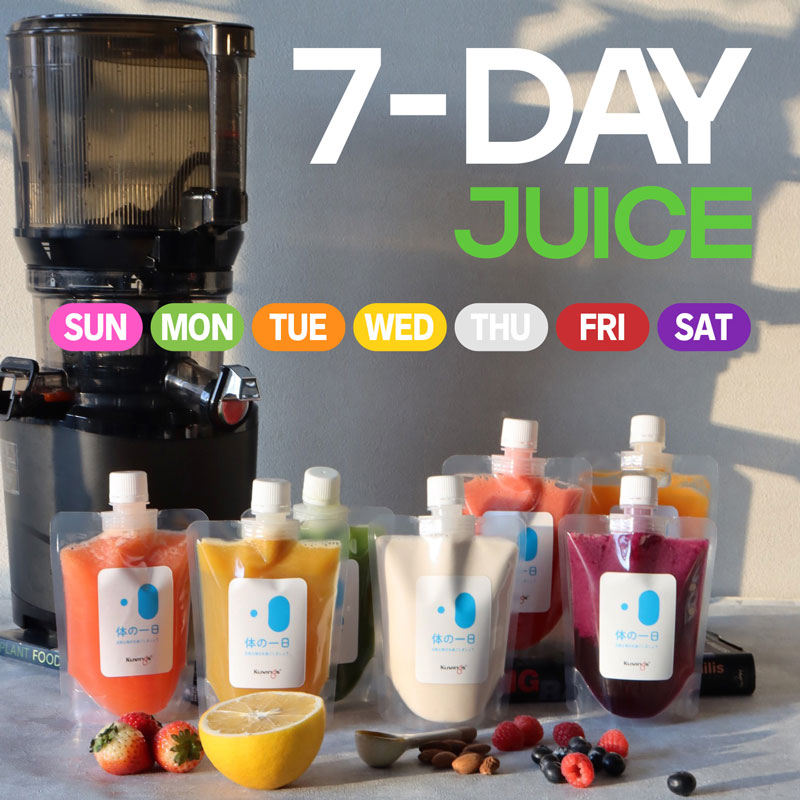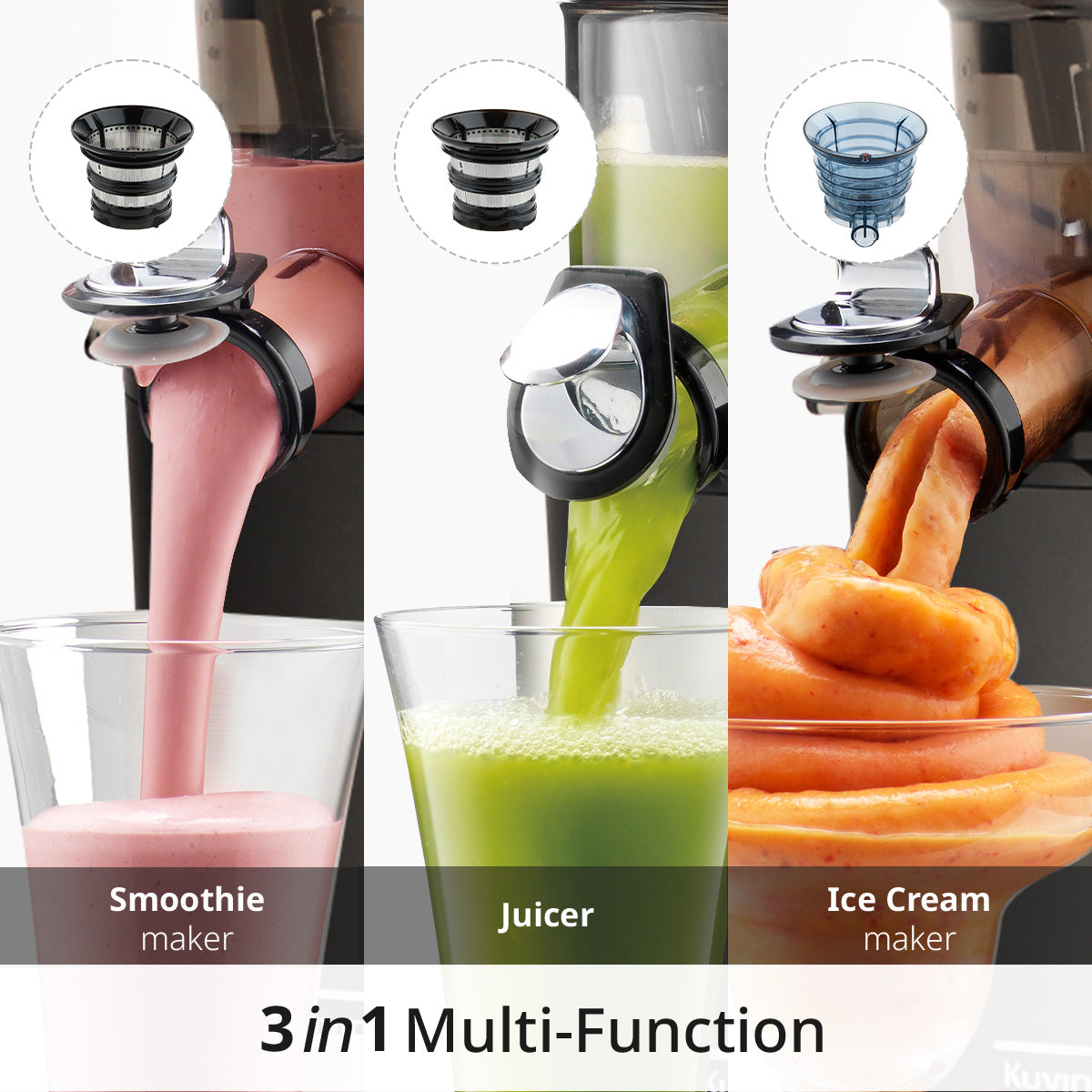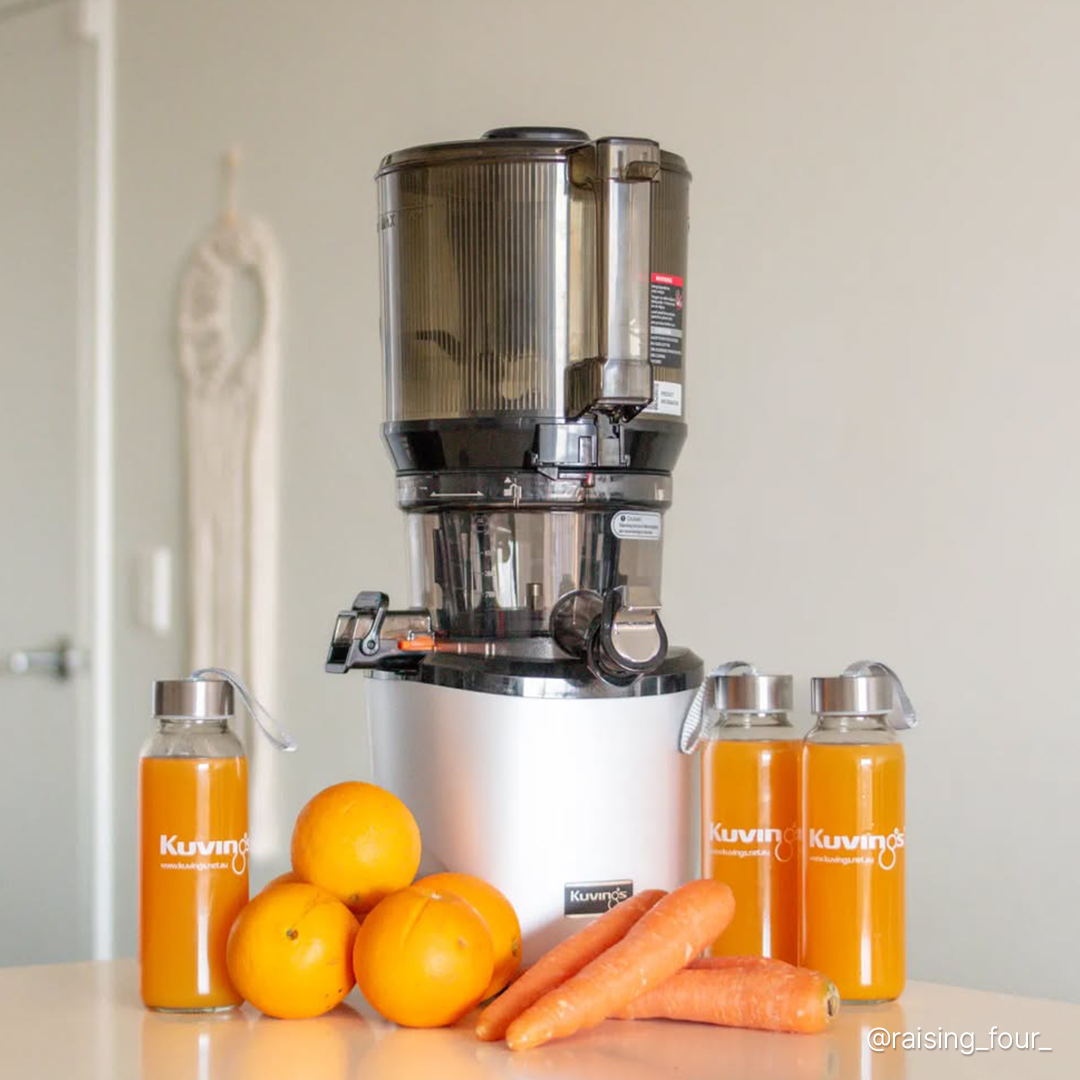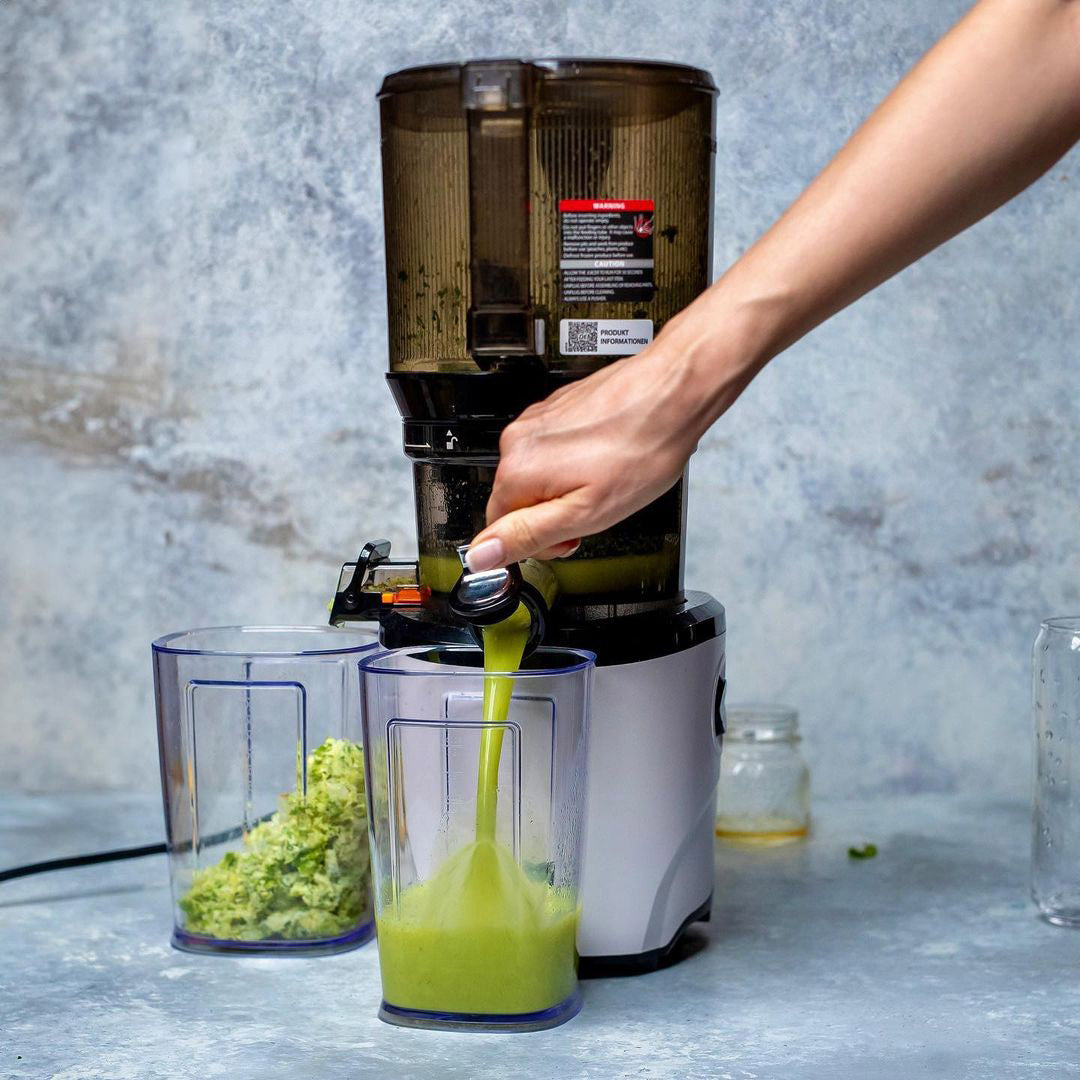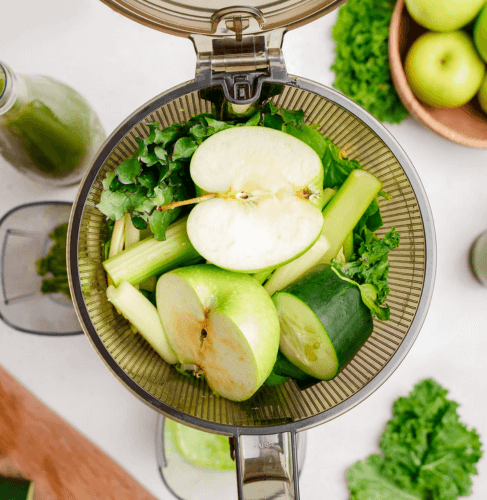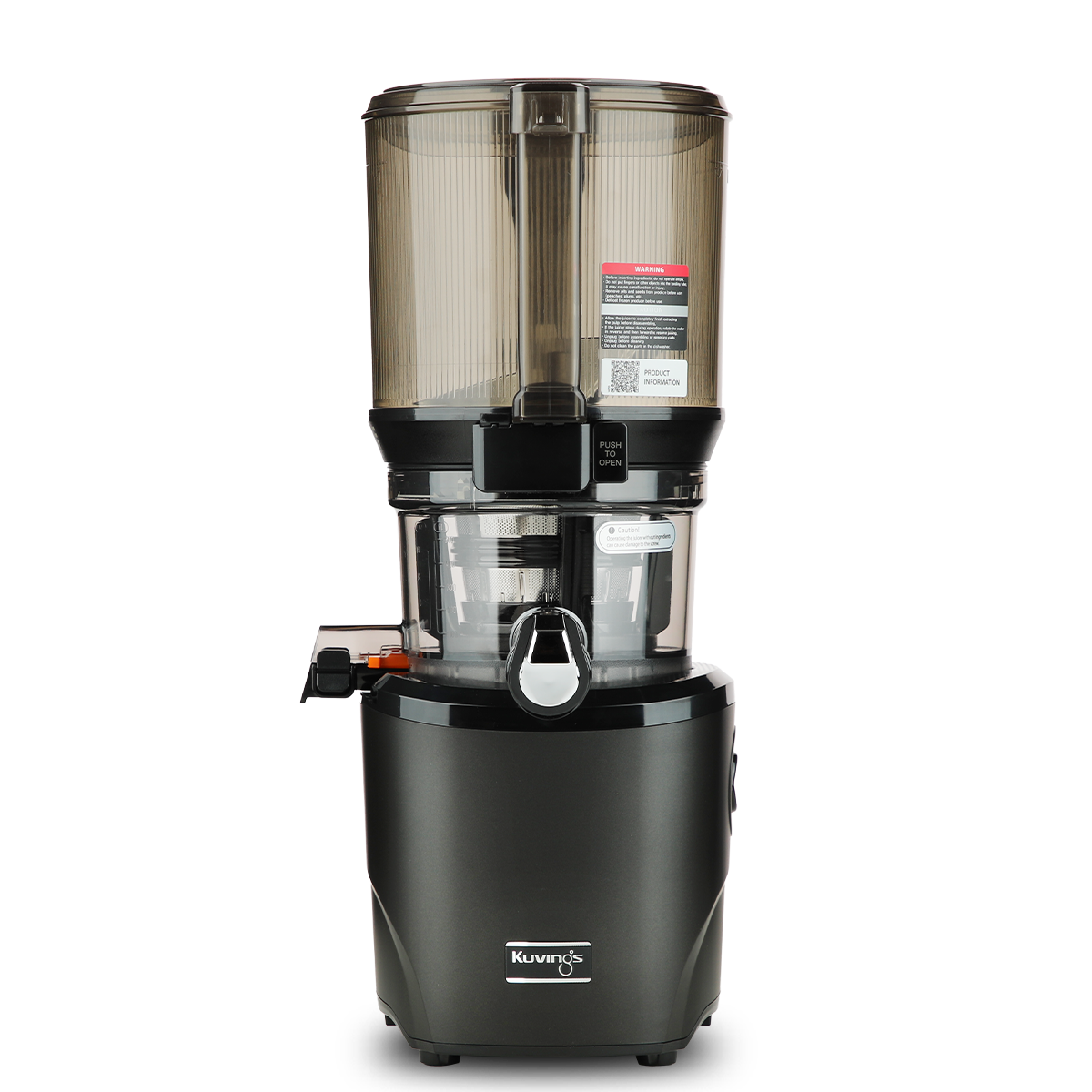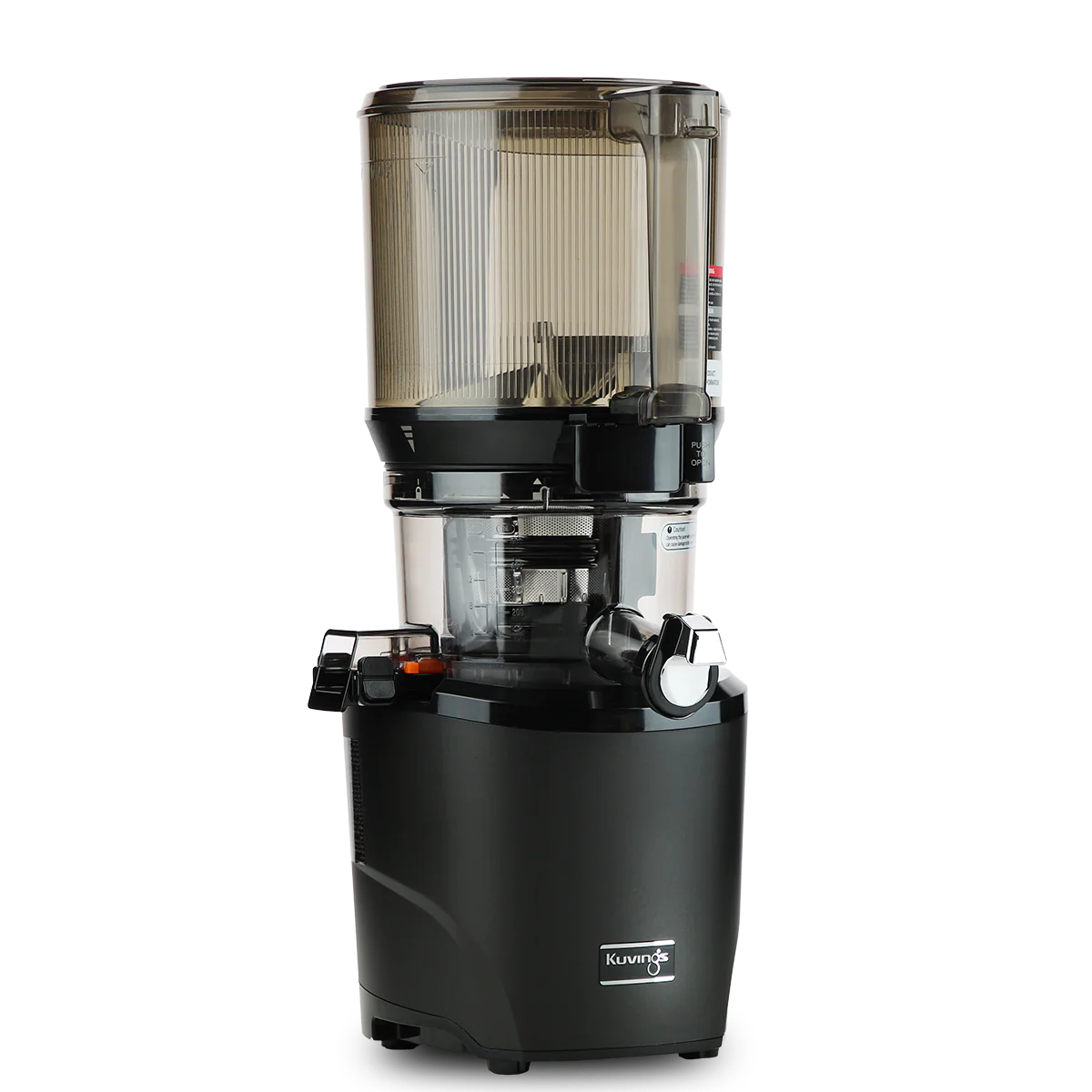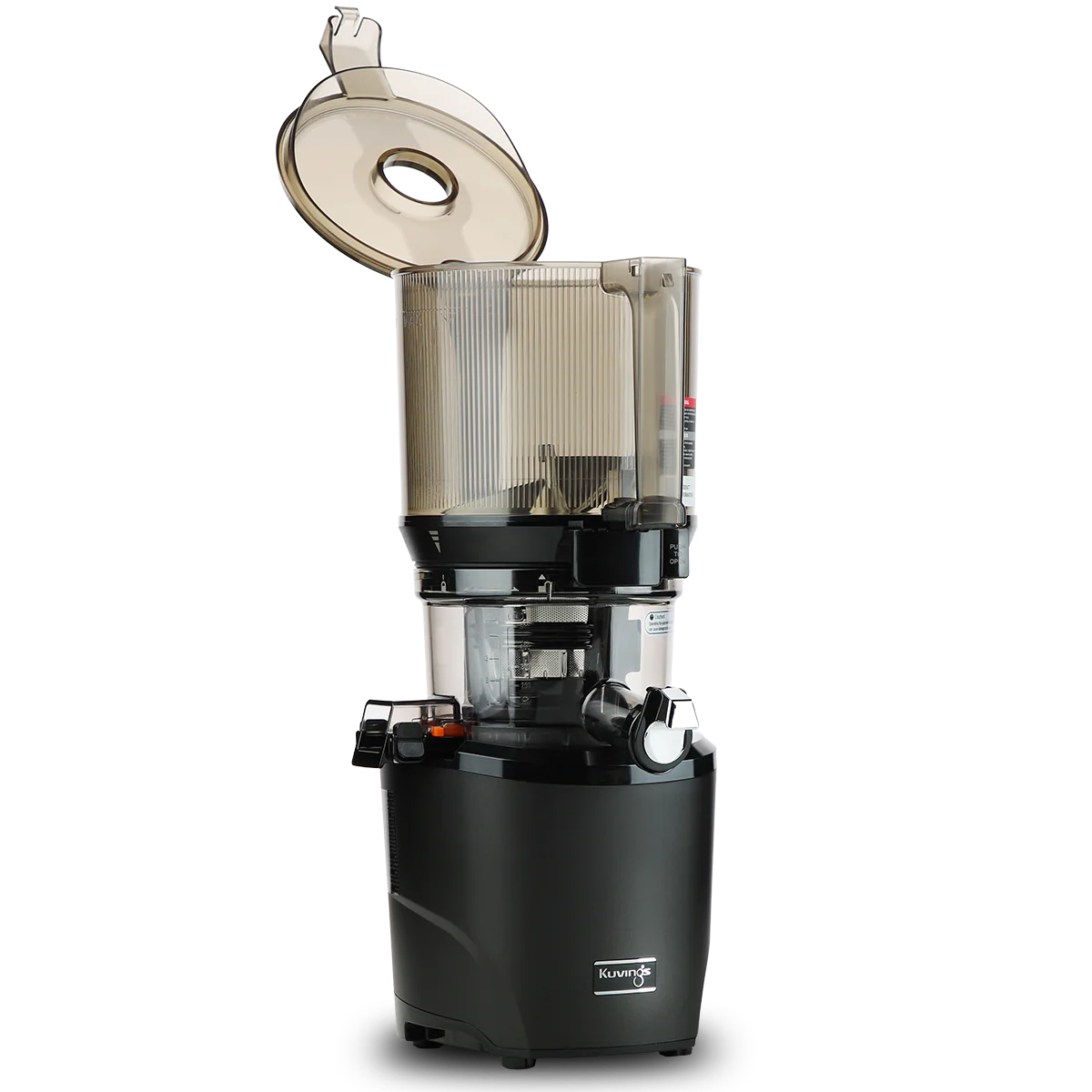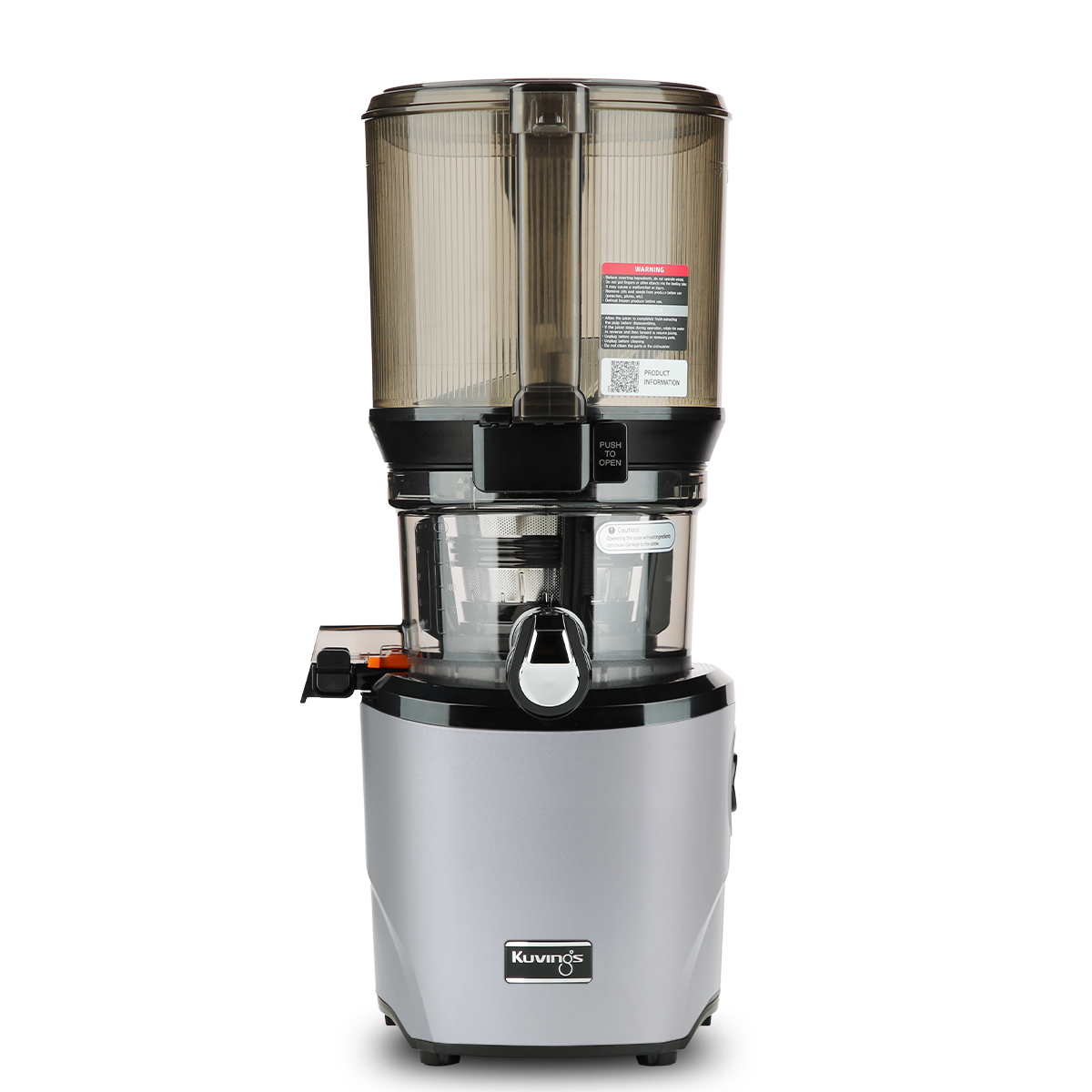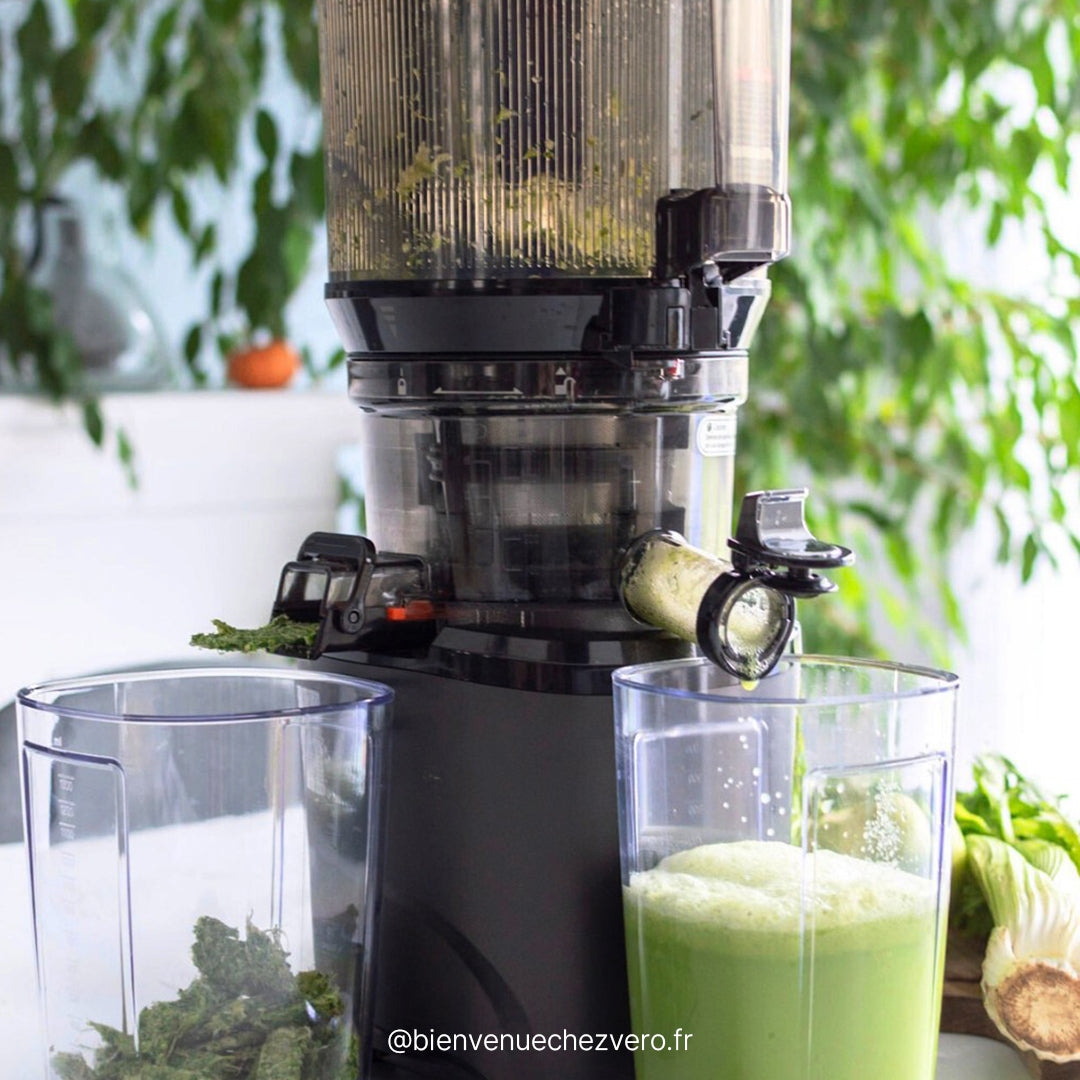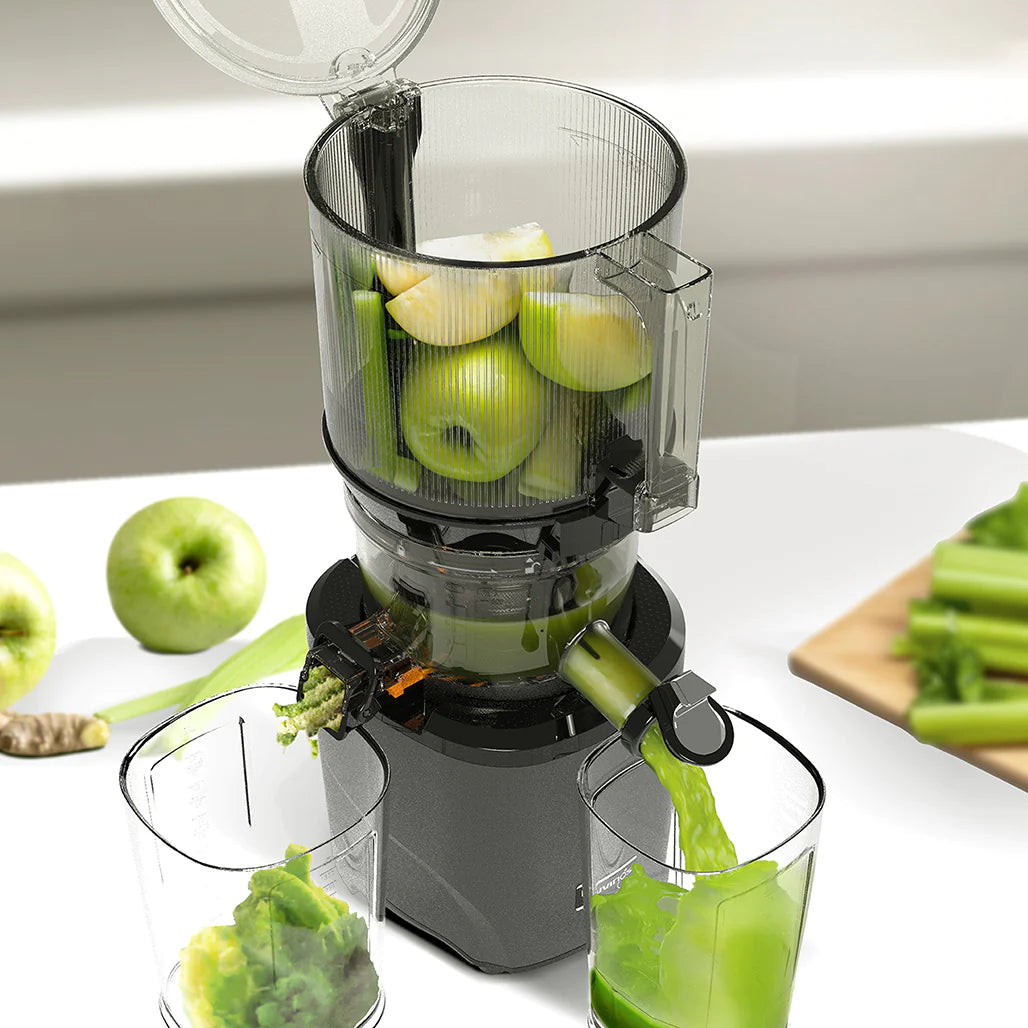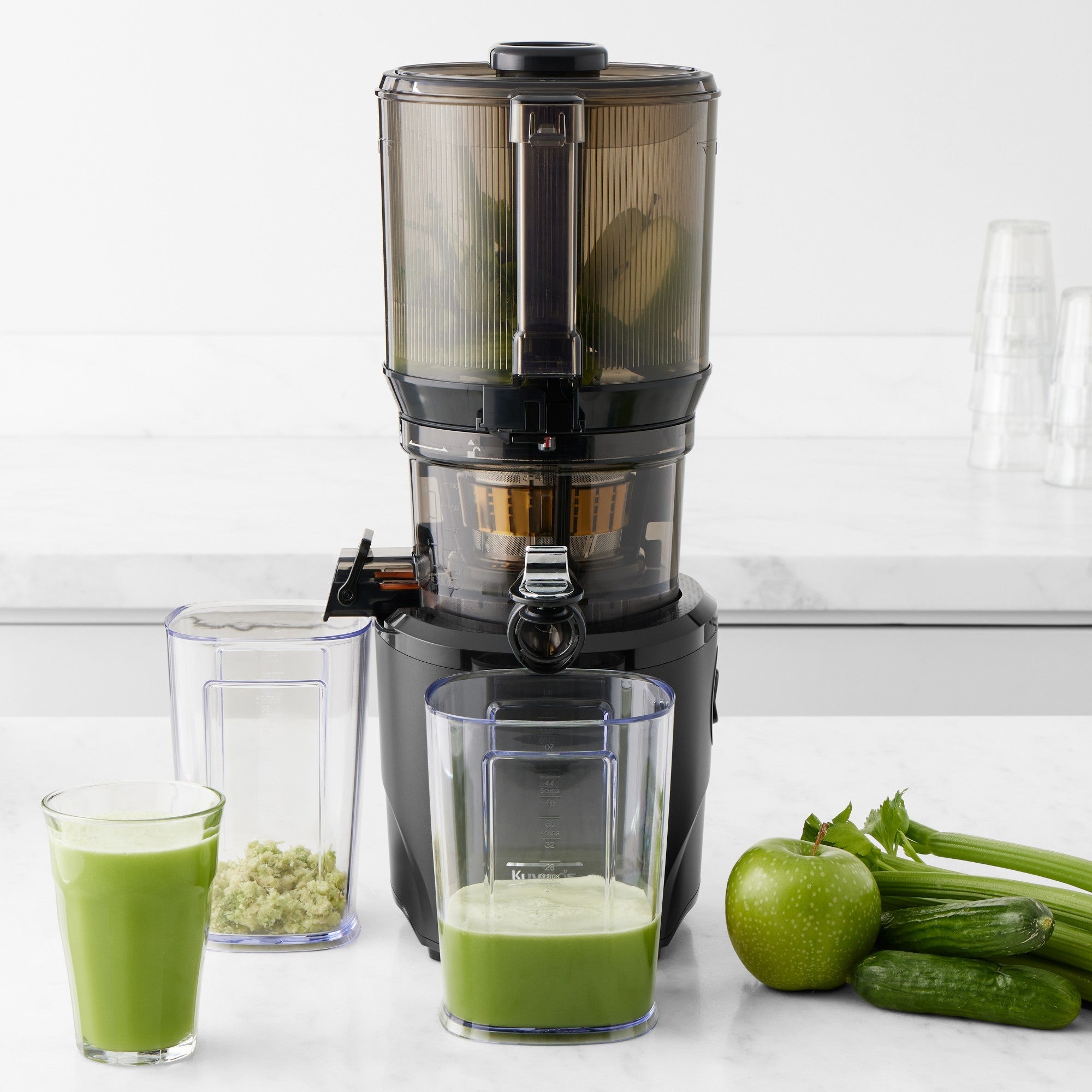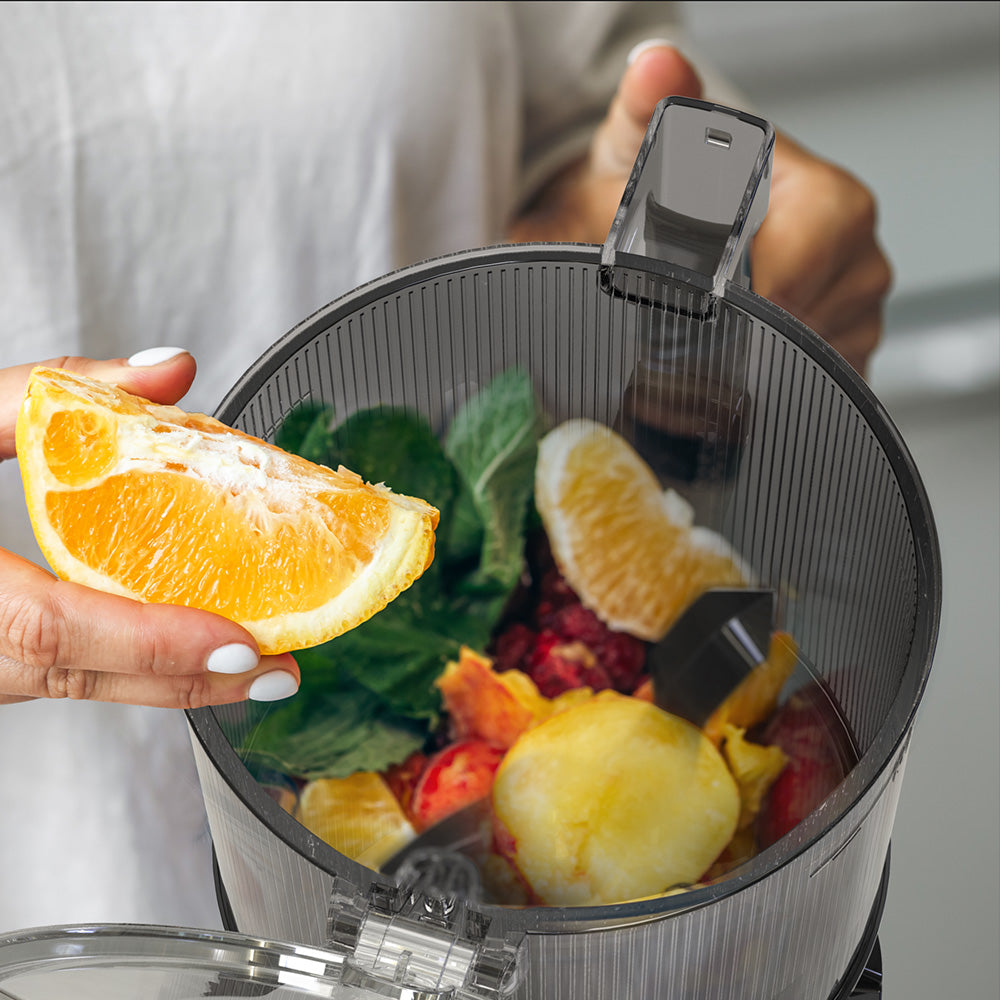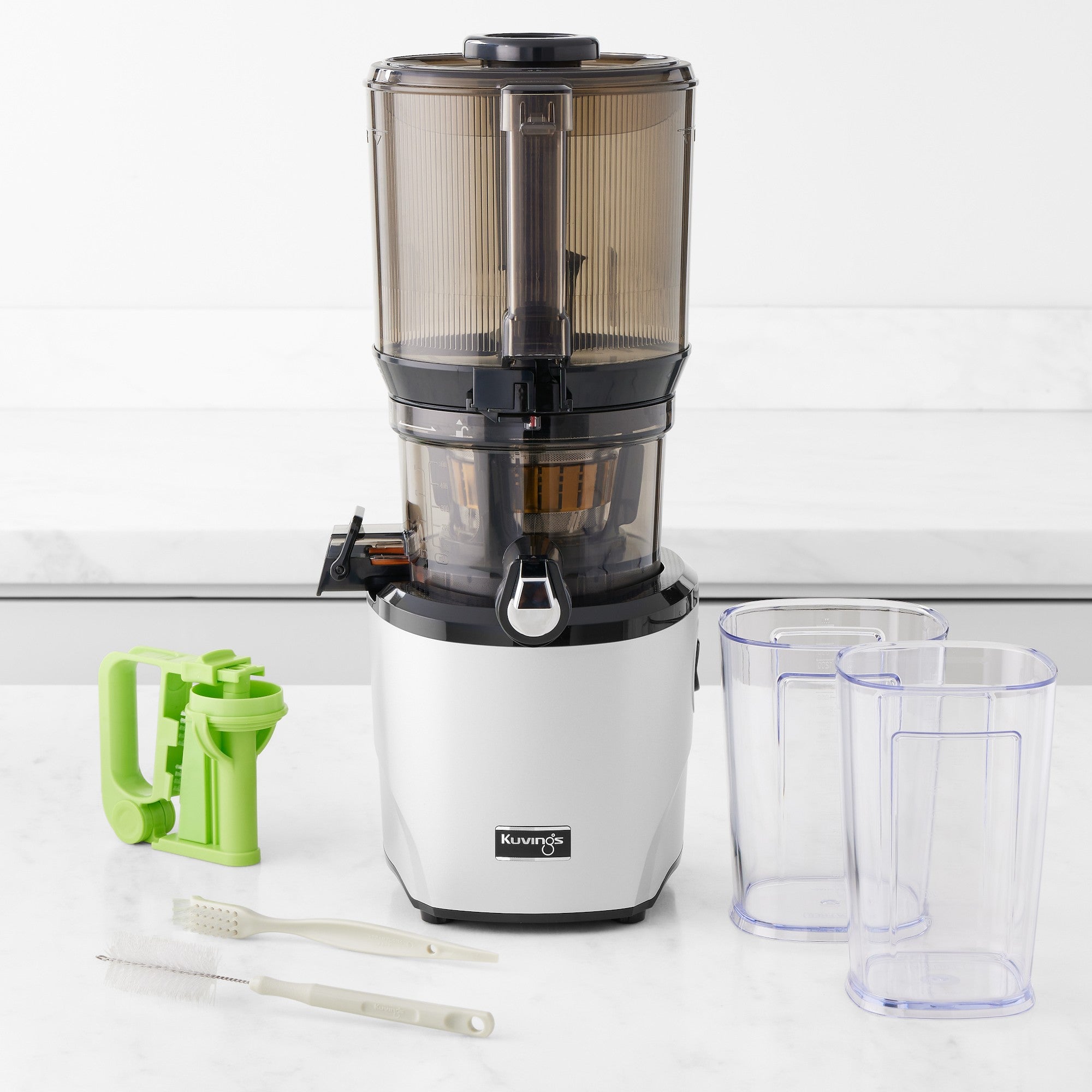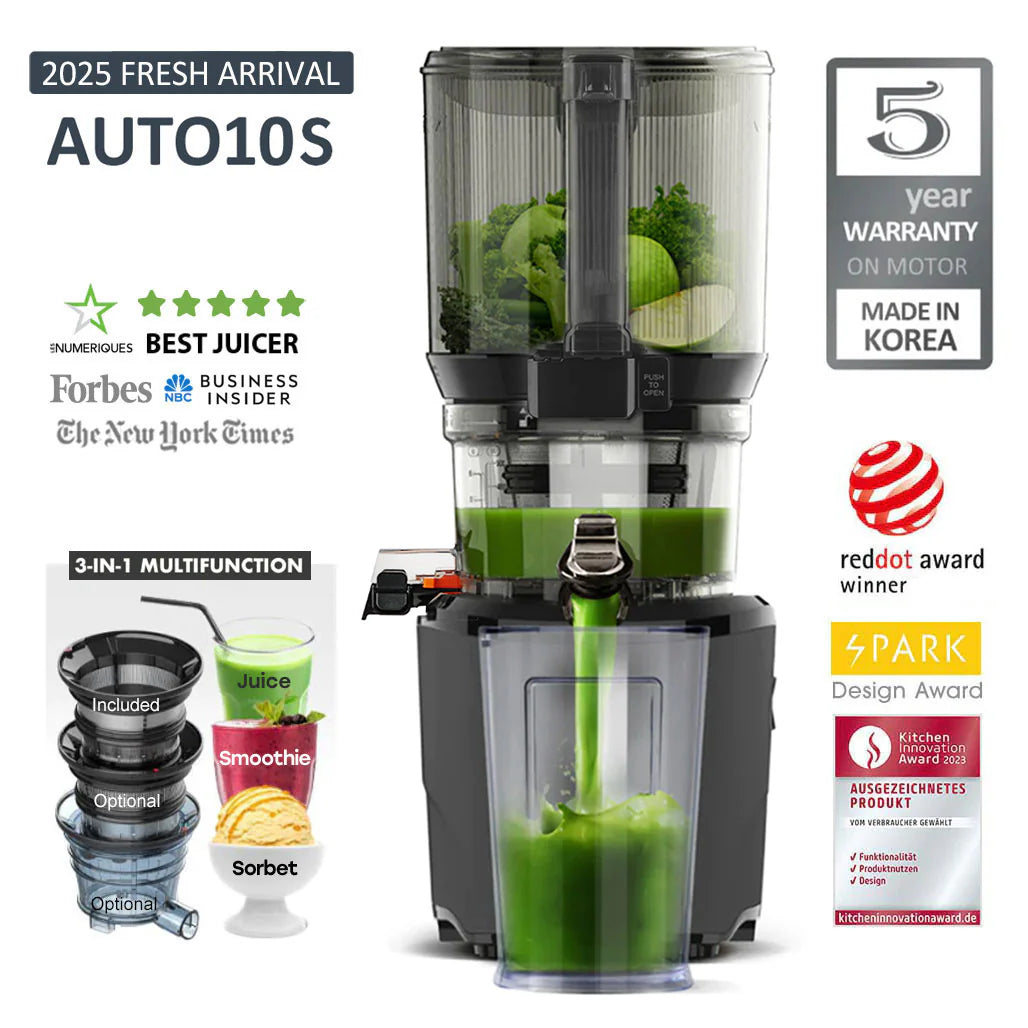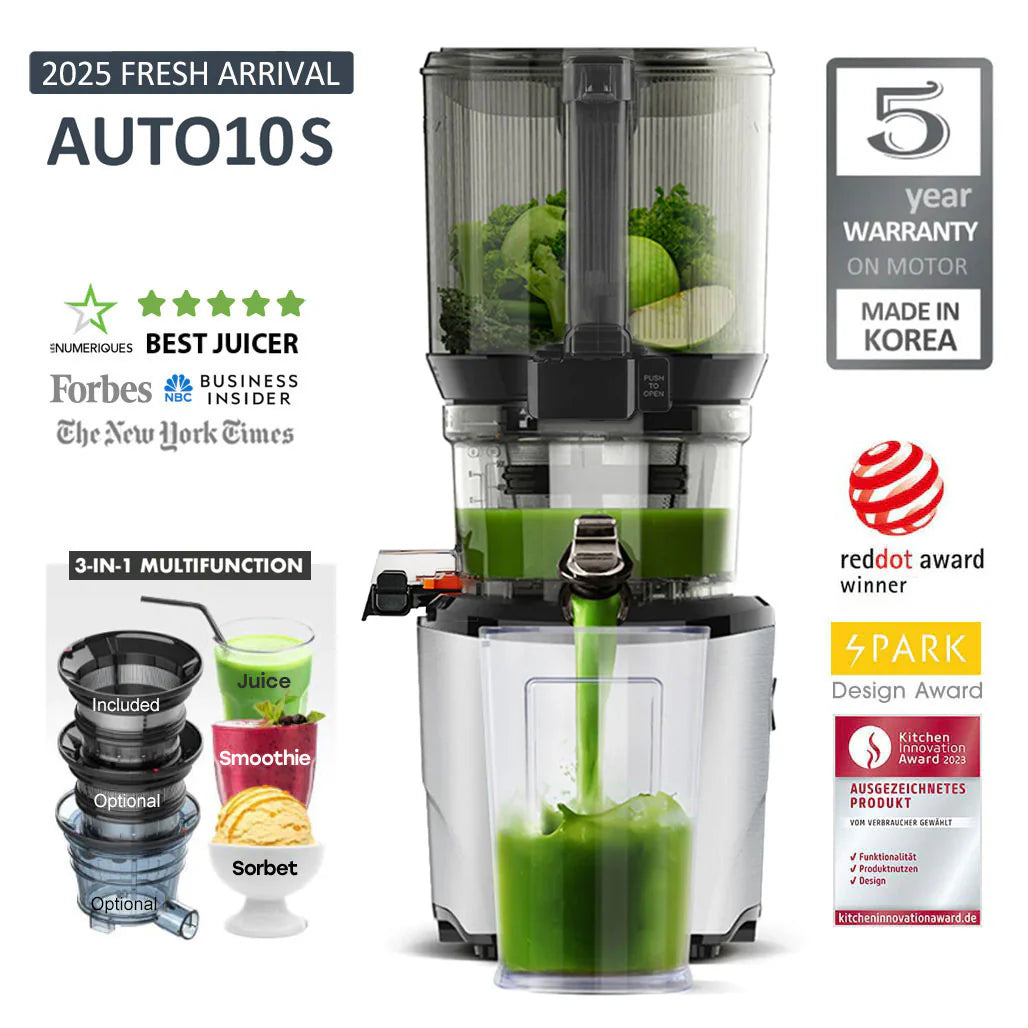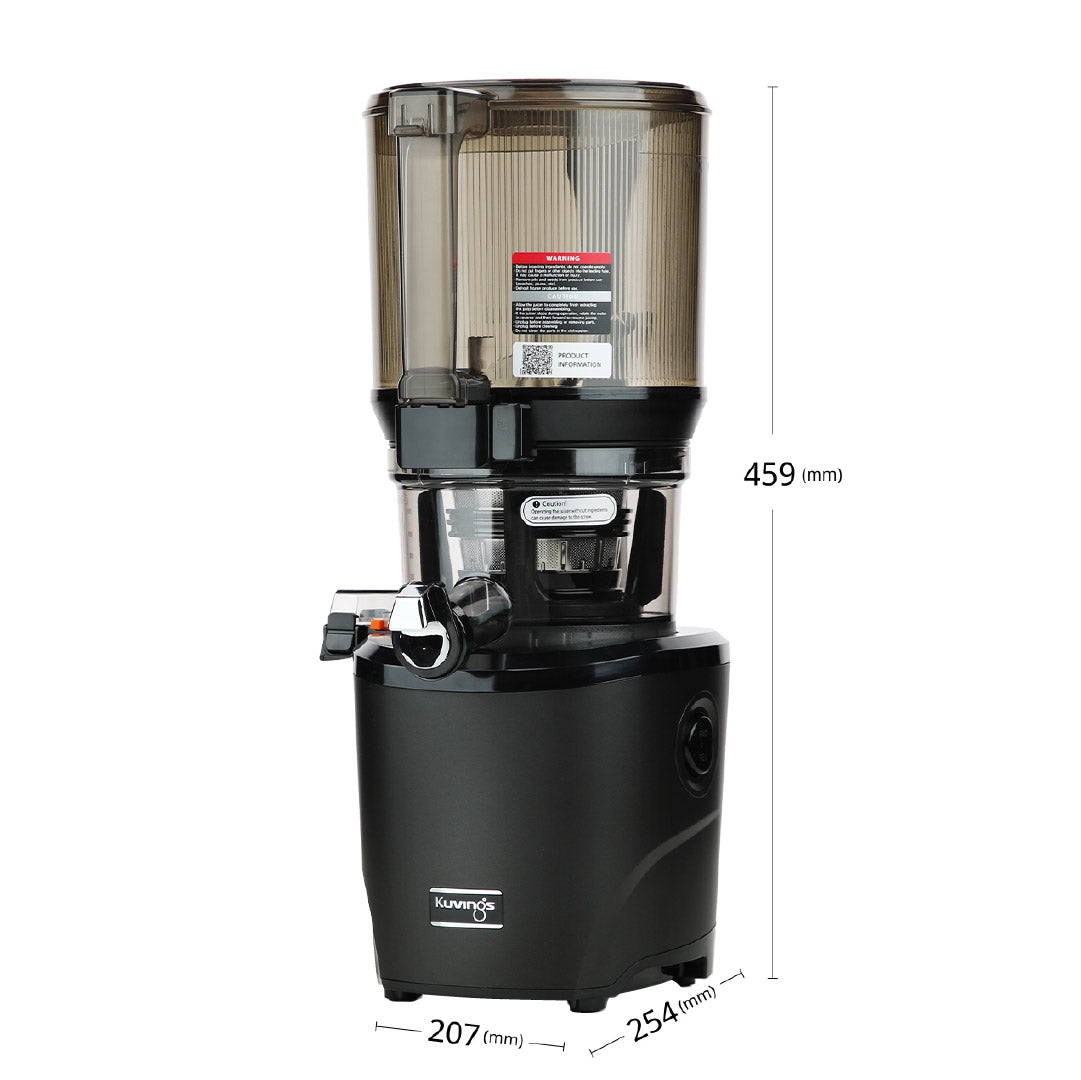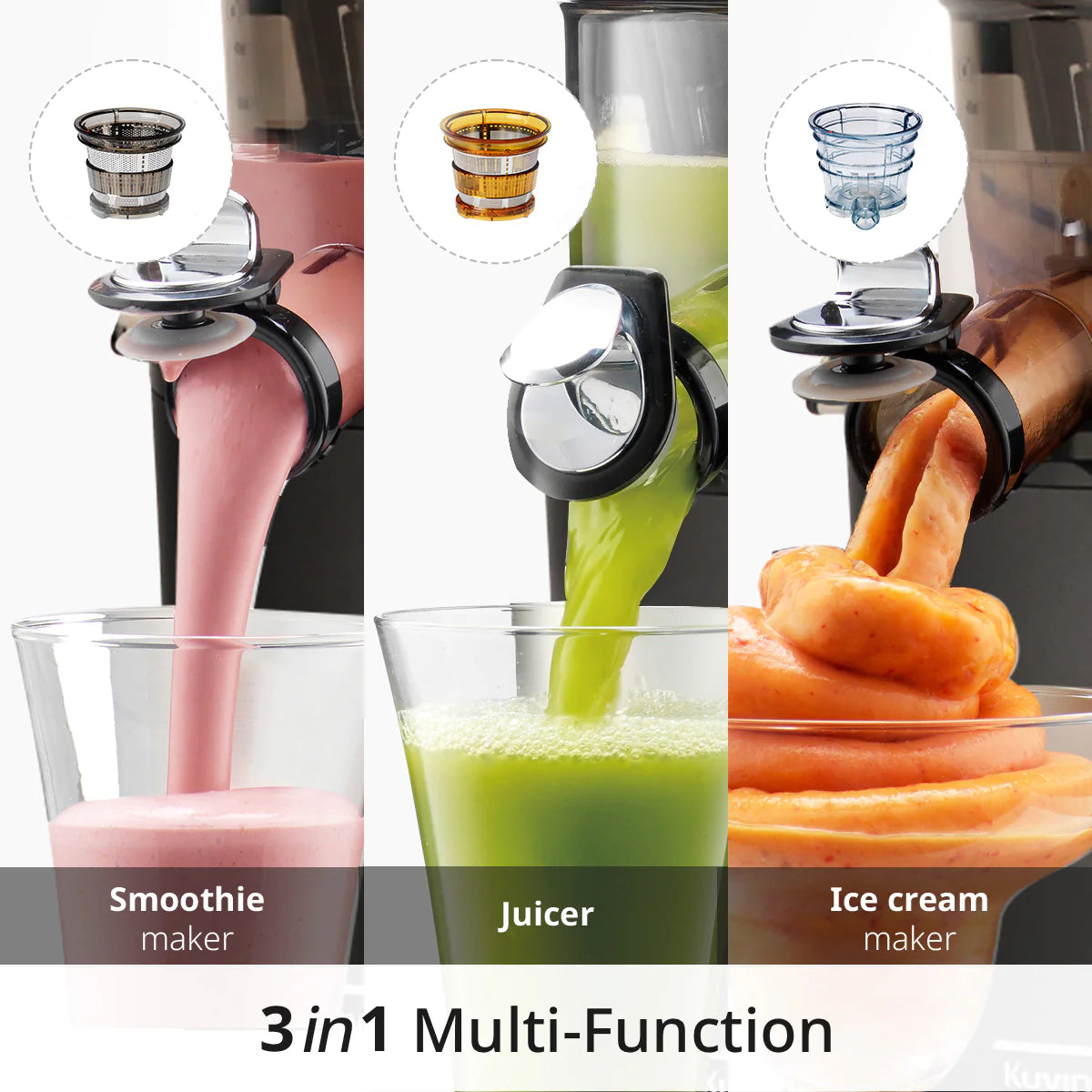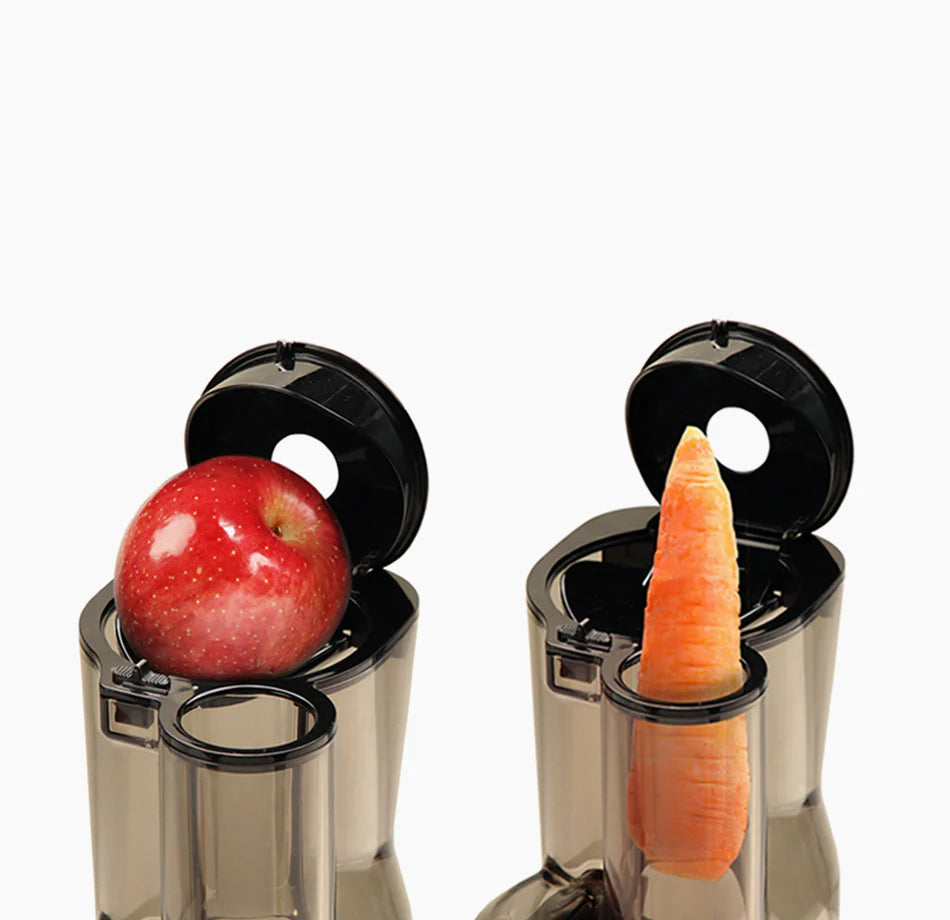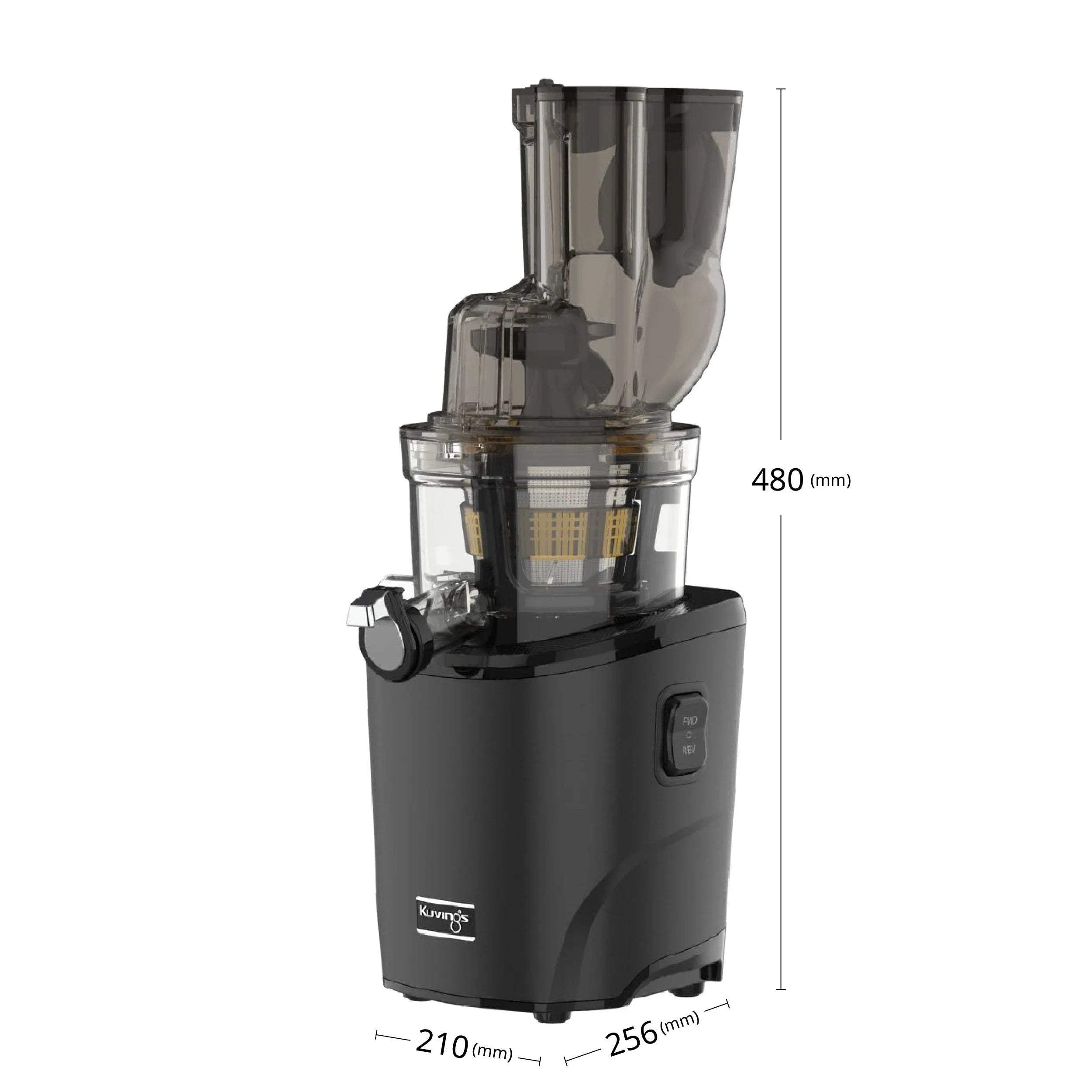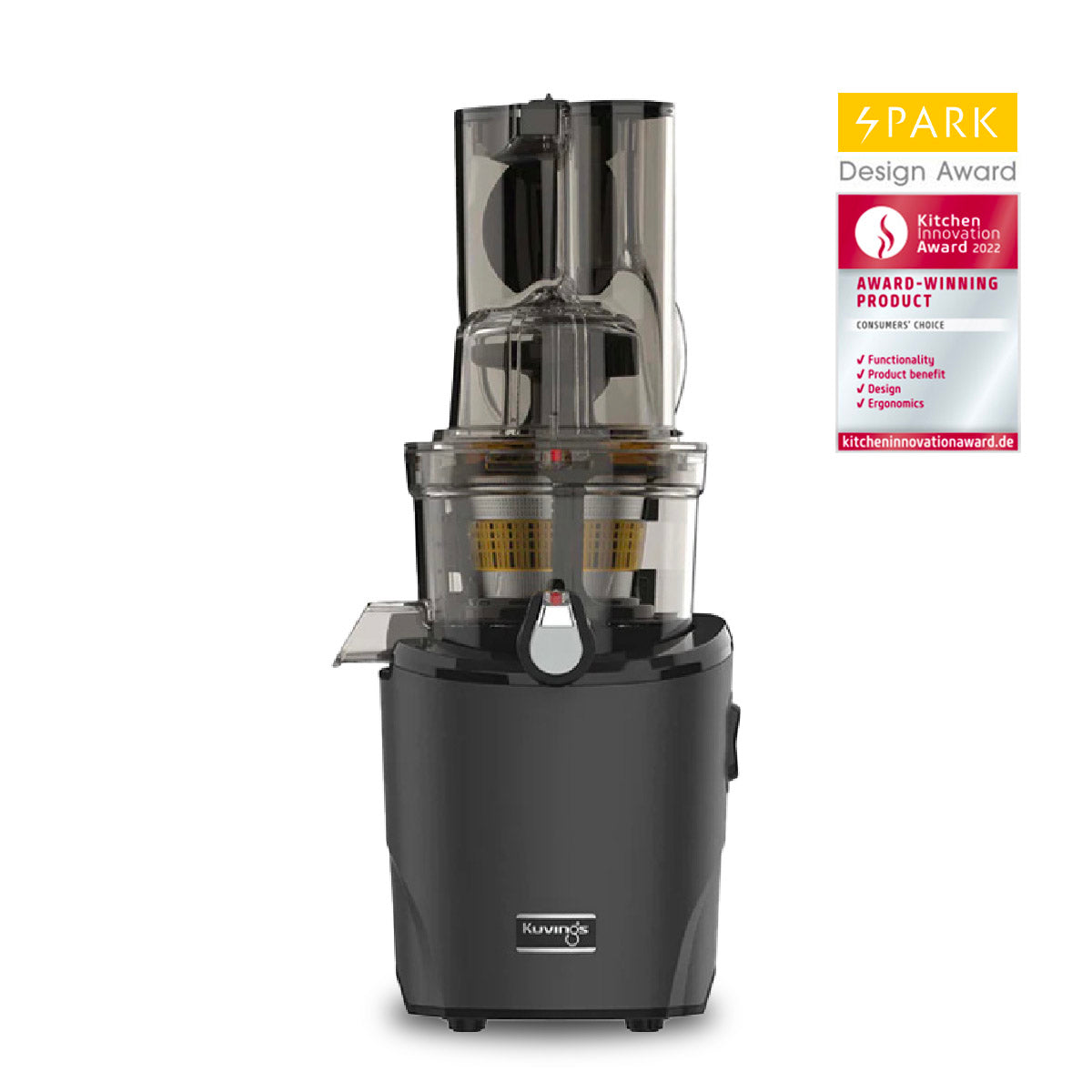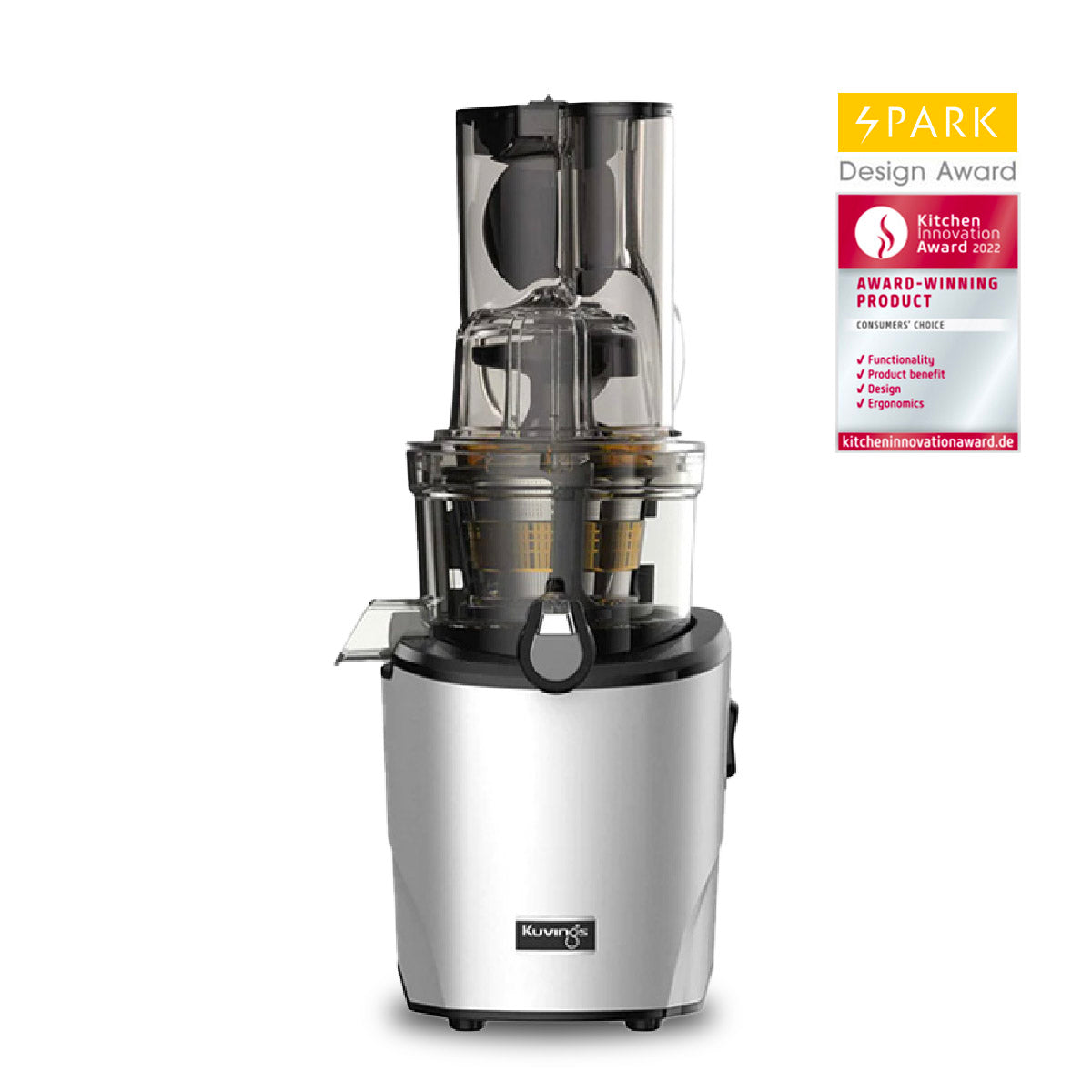This juice recipe is my healthy take on the well-known Bloody Mary cocktail. Instead of the traditional vodka and hot sauce, we have kale and red chill added to a tomato, lemon, and celery base.
What you will notice straight away is this juice is thick and creamy due to all the soluble fiber making its way into the juice. Soluble fiber feeds and nourishes the gut microbiome which bolsters digestive system health.
You don’t need to drink a lot and of course, you can leave out the chilli if you don’t like it hot 🔥
Happy Juicing!

Taste
I like the fresh spicy tomato flavour of this juice recipe. It is salty and herb-like from the kale greens.

Ingredients
- 3 kale leaves
- 4 celery stalks
- 3 tomatoes
- 1 lemon
- 1 red chilli (optional)
- 1 tbsp tamari
Time: 5 mins
Qty: 800 ml
Serves: 4

Preparation
Kale
- Remove leaves from the main stem (you can juice the stem)
- Roughly chop the leaves
Celery
- Chop stalks into small thumb-size pieces across the stalks (this shortens the long stringy cellulose fibre and stops it from wrapping around the press)
- You can juice celery leaves, however it will add bitterness, so discard if you don’t like this
- REVO830: No need to chop into small pieces
- AUTO10S: Cut long pieces to fit in the hopper
Tomato
- Remove green stems an leaves
- Juice whole
Lemon
- Remove stickers and cut off any hard end points
- Slice lemons into rounds with skin on to give more flavour and get more juice from each lemon.
Chili
- Cut of the stalk end
- Cut in half lengthways and remove the seeds if you don’t want it too hot, otherwise, leave them in
Cold Press Juicing Method
Start with the tomatoes as they are the softest ingredient in this recipe. Add them one at a time to the juicer and let each one press through before adding more.
Next juice the chopped kale in handfuls at a time.
Add the chili next if using then add the chopped celery also in handfuls at a time.
Finish by adding the lemon slices all at once.
After you have finished making the juice pour the Tamari into the juice jug and mix with a spoon before serving.
Tip: you can use a Worcestershire sauce or Soy Sauce instead of using Tamari.
Layering AUTO10S: Kale, Tomatoes, Celery, Lemon, Chilli
Health Benefits

Kale
Kale is among the most nutrient-dense foods on the planet. The most beneficial component is its ability to relieve inflammation, thanks to its antioxidants and organic sulphur.
Nutrition: Kale contains isothiocyanates which have been shown to help protect the stomach from H. Pylori bacteria. A nutritionally packed leafy vegetable that contains incredible healing and rejuvenating properties. Kale is rich in omega-3 fatty acids, chlorophyll, amino acids, vitamins A, C, E, K, B-complex and minerals such as iron, magnesium, copper, and potassium.
Cardiovascular / Circulatory System: Kale is high in antioxidants like vitamin C, beta-carotene, and flavonoids. These antioxidants help reduce oxidative stress and inflammation, which are risk factors for cardiovascular disease. It is also rich in Potassium which is an essential mineral that helps regulate blood pressure and help lower blood pressure and reduce the risk of stroke.
Muscular System: Kale is beneficial for the muscular system due to its high content of vitamins, minerals, and antioxidants. It is particularly rich in vitamin K, which plays a crucial role in maintaining healthy bones and muscles. Vitamin K helps regulate calcium, which is essential for muscle contraction. Additionally, kale is a good source of iron, which is necessary for the production of hemoglobin, a protein in red blood cells that carries oxygen to muscles. Including kale in your diet can help support muscle function, repair, and overall muscular health.
Nervous System: Kale also provides a good amount of plant-based omega-3 fatty acids in the form of alpha linolenic-acid (ALA), vital for good brain health.

Celery
Celery is technically a herb however we eat it and cook it like a vegetable.
Celery is a versatile vegetable that offers numerous health benefits, thanks to its unique nutritional profile.
Celery juice is very alkalising in the body, which is extremely important after a good workout to help flush lactic acid from the body.
If you want to learn about the amazing benefits of drinking celery juice I highly recommend the book titled "Celery Juice" by Anthony William.
Here's why celery is good for various systems in our body:
Nutrition: Celery is low in calories but rich in essential nutrients such as vitamin K, vitamin C, potassium, and folate. It also contains antioxidants like flavonoids, beta carotene, and vitamin C.
Cardiovascular System: Celery contains compounds called phthalides, which have been shown to help lower blood pressure by relaxing the muscles around arteries and allowing blood vessels to dilate. The high potassium content in celery can also help regulate blood pressure levels.
Digestive System: Celery is an excellent source of dietary fiber, which is essential for maintaining a healthy digestive system. Fiber helps regulate bowel movements, prevents constipation, and may reduce the risk of digestive disorders like irritable bowel syndrome (IBS) and diverticulitis.
Immune System: Celery contains antioxidants like vitamin C and flavonoids, which help protect cells from damage caused by free radicals. These antioxidants can help strengthen the immune system and reduce the risk of chronic diseases.
Inflammatory Response: Celery contains compounds like luteolin and polyacetylenes, which have anti-inflammatory properties. These compounds may help reduce inflammation in the body, which is linked to various chronic diseases.
Detoxification: Celery is a natural diuretic, which means it can help flush out toxins from the body by increasing urine production. It also contains compounds that may help stimulate liver enzymes, which are involved in detoxification processes.

Tomato
Tomatoes are a versatile fruit that is botanically classified as a berry. They come in a variety of colours, shapes, and sizes, with flavours ranging from sweet to tart. They are rich in vitamins, minerals, and antioxidants, making them a healthy addition to any diet.
Nutrition: Tomatoes are a good source of vitamins A, C, and K. They also contain potassium, manganese and are rich in antioxidants.
All Systems: Tomatoes are a nutritional powerhouse, benefiting all body systems. They're rich in vitamins A, C, and K, essential for vision, immune function, and blood clotting. Additionally, they contain minerals like potassium and manganese, crucial for heart health, muscle function, and bone health. Tomatoes are also packed with antioxidants, including lycopene, beta-carotene, and vitamin C, which reduce inflammation and oxidative stress, lowering the risk of chronic diseases like heart disease and cancer.
Cardiovascular / Circulatory System: Tomatoes are a rich source of antioxidants, such as lycopene, vitamin C, and beta-carotene. These antioxidants help reduce inflammation and oxidative stress in the body, which are risk factors for heart disease. Lycopene, a carotenoid pigment that gives tomatoes their red color, has been linked to a reduced risk of heart disease. It may help lower levels of LDL (bad) cholesterol and reduce the risk of blood clots. Tomatoes are also a good source of potassium, a mineral that helps regulate blood pressure. Consuming potassium-rich foods like tomatoes can help lower blood pressure and reduce the risk of heart disease.
Digestive System: Tomatoes are not only delicious but also incredibly nutritious, thanks to lycopene, their standout nutrient. Lycopene is particularly beneficial for liver health, as it helps shield the liver from cell damage and supports the safe and efficient detoxification of red blood cells. This makes tomatoes a great addition to your diet for promoting digestive health and overall well-being.
Immune System: Tomatoes are also great for the Immune System. Nutrients in the tomatoes first encourage the body to produce more T cells, white blood cells that combat foreign substances like bacteria and viruses. The nutrients in the tomatoes also protect these white blood cells from free radical damage.
Muscular System: Tomatoes are beneficial for the muscular system due to their rich nutrient content. They are a good source of potassium, which is essential for muscle contraction and maintaining electrolyte balance. Additionally, tomatoes contain antioxidants like vitamin C and lycopene, which help reduce inflammation and oxidative stress in muscles. The vitamin K in tomatoes is also important for bone health, supporting the structure of muscles and preventing muscle weakness. Including tomatoes in your diet can help support muscle function, repair, and overall muscular health, making them a valuable addition to any diet.

Lemon
Lemons are a must have ingredient in any juicing kitchen. They help make veggie juices taste better and help fruit juices last long when stored in the fridge. Lemons are rich in bioflavonoids which can significantly boost the immune system and reduce inflammation in the body. Lemon juice is known to be particularly beneficial for colds, coughs, and sore throats.
Lemons are not only a bright and tangy addition to dishes but also offer a range of health benefits. Here's why lemons are good for various systems in our body:
Nutrition: Lemons are low in calories but high in vitamin C, a powerful antioxidant that helps protect cells from damage. They also contain citric acid, potassium, and other nutrients that support overall health.
Digestive System: The citric acid in lemons can help improve digestion by stimulating the production of stomach acid. This can aid in the digestion of food and prevent digestive issues like indigestion and bloating.
Immune System: Vitamin C is essential for a healthy immune system. Lemons are a great source of vitamin C, which can help boost the immune system and reduce the duration and severity of colds and flu.
Detoxification: Lemons are often used in detox diets because they can help cleanse the body and promote the elimination of toxins. The citric acid in lemons helps stimulate the liver, which is the body's main detoxification organ. Lemons act as a cleanser and astringent; they squeeze toxins from the tissues and stimulate the liver to detoxify. Lemon juice is also beneficial for removing poisons in the form of old drug residues from the body.
Skin Health: The antioxidants in lemons, including vitamin C, can help reduce the signs of aging and improve skin health. Lemon juice can also be used topically to lighten dark spots and blemishes on the skin.
Hydration: Lemon water is a refreshing and hydrating beverage that can help keep you hydrated throughout the day. Staying hydrated is important for overall health and can help improve energy levels and mood.

Chilli (red)
Red chilli peppers are not just a fiery addition to your favourite dishes; they also offer a range of health benefits. However, it's important to consume them in moderation, especially if you have a sensitive stomach or digestive issues. Here's why red chillies are good for various systems in our body:
Nutrition: Red chillies are rich in vitamins A, C, and E, as well as minerals like potassium and folate. They also contain capsaicin, the compound responsible for their spicy heat, which has been linked to various health benefits.
Cardiovascular System: Capsaicin in red chillies may help improve heart health by reducing cholesterol levels, improving blood flow, and lowering blood pressure. It can also help prevent the formation of blood clots, which can reduce the risk of heart attacks and strokes.
Digestive System: Red chillies can stimulate the production of stomach acid, which can improve digestion. They may also help reduce the risk of stomach ulcers by killing harmful bacteria in the stomach.
Immune System: The high vitamin C content in red chillies can help boost the immune system and protect against infections. They also contain antioxidants that help fight free radicals and reduce inflammation in the body.
Metabolic Health: Capsaicin has been shown to increase metabolism, which can help with weight loss. It may also help regulate blood sugar levels, which is beneficial for people with diabetes.
Pain Relief: Topical application of capsaicin has been found to reduce pain by desensitizing nerve receptors. It is often used in creams and patches to relieve pain from conditions like arthritis and neuropathy.
Recipes: click here

Gary Dowse
Master Juice Chef, Kuvings Australia
Gary is a powerhouse in the world of juicing and plant-based nutrition, driven by an unwavering passion for health and wellness. With certifications in natural juice therapy and whole food plant-based nutrition, Gary is a dedicated educator, empowering individuals to harness the transformative benefits of juicing and plant-based eating.
Through his enlightening books and dynamic online courses, Gary champions the preventative and restorative healing powers of embracing a lifestyle rich in vibrant juices and whole, plant-based foods.
His mission is to inspire and guide others on their journey to optimal health and vitality.
Disclaimer: information contained in this post is for educational purposes only, sourced from various books and websites. If you do anything recommended without the supervision of a licensed medical doctor, you do so at your own risk. The author, Gary Dowse, does not dispense medical advice or prescribe the use of any technique as a form of treatment for physical, emotional or medical problems without the advice of a physician, either directly or indirectly.

